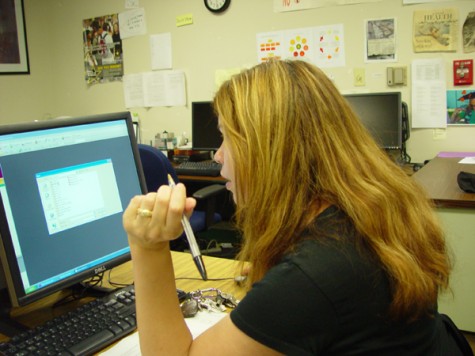Adjusting to life at GCC is challenging yet rewarding for International Students. While dealing with culture shock and the language barrier, they must take assessment tests, follow an education plan, make new friends and ultimately complete at least 12 units.
“It’s important to do well when first starting out,” said David Nelson, the director of recruiting international students, who travels the globe in his work. “Good grades, a good foundation in English, and working relationships with both teachers and classmates are essential,” he said.
Nelson has had good luck when reaching out to Southeast Asia and Sweden. He is currently on a tour of educational fairs in China, Hong Kong, Indonesia and Vietnam. He said, “Sometimes, age differences can make the adjustment intimidating. Students, who are too young and have never travelled before, may be terrified when they first get here. But there are counselors, activities and a club for building a support system here.”
Out of the 16,000 students attending GCC, more than 450 are international students with an F-1 visa from more than 50 countries, according to the International Student Program office. Another 50 or so are here with other types of visas. To get an F-1 visa, foreign students must show proof of financial backing, have strong ties to their home country and possess the intent to return home after their studies. The countries most represented are Japan, Korea, Vietnam, the Philippines, Indonesia, Taiwan, China and Hong Kong, Sweden, Sri Lanka and Armenia.
Kawing Leung, 19, an economics major, was born in Hong Kong and was raised there until she came to the U.S. in 2008. ?She used to be a model, but now she plans to join the family business, which acquires bankrupt companies.
International students may tend to isolate when facing a strange new environment.
Besides her position as treasurer for the International Student Association (ISA), Leung mainly keeps to herself and her 300 friends on Facebook or watches soap operas, which she can get in Cantonese via the Internet.
International student adviser and senior coordinator Anh Nguyen suggests that students “Get out there and meet new people” in order to avoid patterns of escape. Finding friends or counselors to “lean on”?is critical.? “Stress is cyclical.very high from the first couple weeks of the semester.”? Besides dealing with personal shopping needs,?adjusting to a new housing environment, often suffering an illness, and dealing with transportation, an international student must learn what the expectations of teachers are and how the courses are run.? “So we do a little hand-holding from the beginning to help students get off to the right start.”
“Supports given to the international students here are, I think, the best amongst all colleges,” said Leung.?”Counselors are so nice and are always of help for things like enrolling in classes or finding a roommate.”
When it comes to Leung’s studies, her oceanography class is fine, but reading Shakespeare’s sonnets in English 101 really bugs her: “What was he trying to say?” she?complains, “I have to look up almost every single word!”?? She dreads having to read a whole Shakespearian play.
“College is a lot different from high school” Leung continues. High school in Hong Kong, which is not the same as high school in the U.S., is quite different than GCC. “The hardest thing that I am currently still adjusting to?is how the professors teach.? In high school, teachers remind us and are of help every day, but in college everything is on our own.? Also, relationships with classmates aren’t that close anymore; people get into the classrooms, take notes, and leave.”
As for someone to lean on, Leung said “I just love my economics professor, Caroline Kaba.
“Last semester, I was having problem with my family and was severely depressed. She helped me out and comforted me. If it was not for her, I think I would have had a nervous breakdown.”
Leung added, “I used to find it hard to seek help from others.? But things do get easier now as I am more active in the International Students Association (ISA). I can always seek help from fellow international students.”
Minh Tran, 19, a business administration major, born to Chinese parents living in Vietnam, was elected ISA historian. He records the minutes and takes photos of the club’s meetings. He says the position helps him with his management, teamwork and leadership skills. His major obstacle in adjusting to GCC has been his English.
“My English is now much more better since I first stepped into GCC,” he said. His goal is to transfer to USC and become a promotions manager in the music industry or return to Ho Chi Minh City to work for the accounting firm KPMG.
Tran is braving 16 units, including Calculus 2, but says his courses are not too hard. “The best thing about GCC is its dedicated professors.”
Tran also likes GCC’s diversity. “I almost have any chance to meet people from all around the world. It’s always awesome for me to learn about new cultures every day and make new friends.”
“I just love it being here,” said Umi Ngom, 21, a nutritional science major. She has a lot of U.S. and British friends in Japan, so speaking English has not been a challenge. Being of mixed race, Asian and African, she feels much more comfortable here in Southern California than she does in Japan.
“The people are friendly to talk to,” she said, “especially my favorite teacher, math professor David Hassett. I was taking his class when my dad passed away in Senegal. Mr. Hassett was so supportive. When I had to go to the funeral and missed some classes, he arranged it so I could still keep up with the homework and I got an A.
“Everything in Japan is cleaner than here, especially the bathrooms,” said Ngom, “So I love the GCC campus because it is so clean.”
Her advice to new arrivals is the following: “If you are Japanese, stop hanging out with other Japanese because that doesn’t help English speaking. There’s a lot of interesting culture to explore, so get free of your homeland pals and meet new people.”
Nancy Yalley, 27, a speech major, is from Gothenburg, Sweden. In adjusting to GCC, she has found, “There is not a lot to do here but to study, versus Santa Monica College, which has a lot more Swedish students to interfere with my studies.”
What Yalley likes most about GCC is the great support she has received from her international counselor, Maria Ribeiro, and her boss on campus, teacher Dana Marterella. When Yalley had to go to traffic court to defend her right to use her international drivers license in California, she found the moral support she needed.
“I couldn’t have made it this far without them!” said Yalley. The GCC professors have “extreme passion for what they do. That in itself creates an optimistic environment.”
Yalley’s is of mixed race, white and African. Her only complaints about GCC are the lack of diversity and the lack of places to study. In other words, she has observed that GCC has very few black students. Also, she has noticed that the library is too often full. “Oh wait!” she said, “And the fact that 16,000 students are supposed to share ONE microwave!”
Anna Gharibyan, 25, music major is a former international student. She now has a green card thanks to her parents who took care of most of the hard work involved in getting documentation. She now saves $181 per unit and pays much less than the tuition and fees of more than $2,600 per semester for international students.
In Russia, Gharibyan had exceptional English teachers so she had less of a language problem when she got to America. She said, “Life at GCC is friendly and family-like. The teachers push you. Most of the time I work on music and I can say they have a really great department here. The dance department is amazing, too. You get everything you need to be a professional.”
Sufficient grades and appropriate conduct are required in order to prevent the F-1 international student visa from being revoked. According to David Nelson, an entire article could be written on how the U.S. State Department favors some countries over others. Most international students can only admit privately that they would like to stay in America after their studies, for example by getting a work visa or by marrying an American citizen. Otherwise, these foreigners must return to their homeland after one or more years of education abroad.
Adjustment to GCC may be challenging, but it is also rewarding, and GCC does appreciate its international students.
“Some professors are so nice that two semesters after I’ve taken their classes, we still keep in touch,” said Leung.



